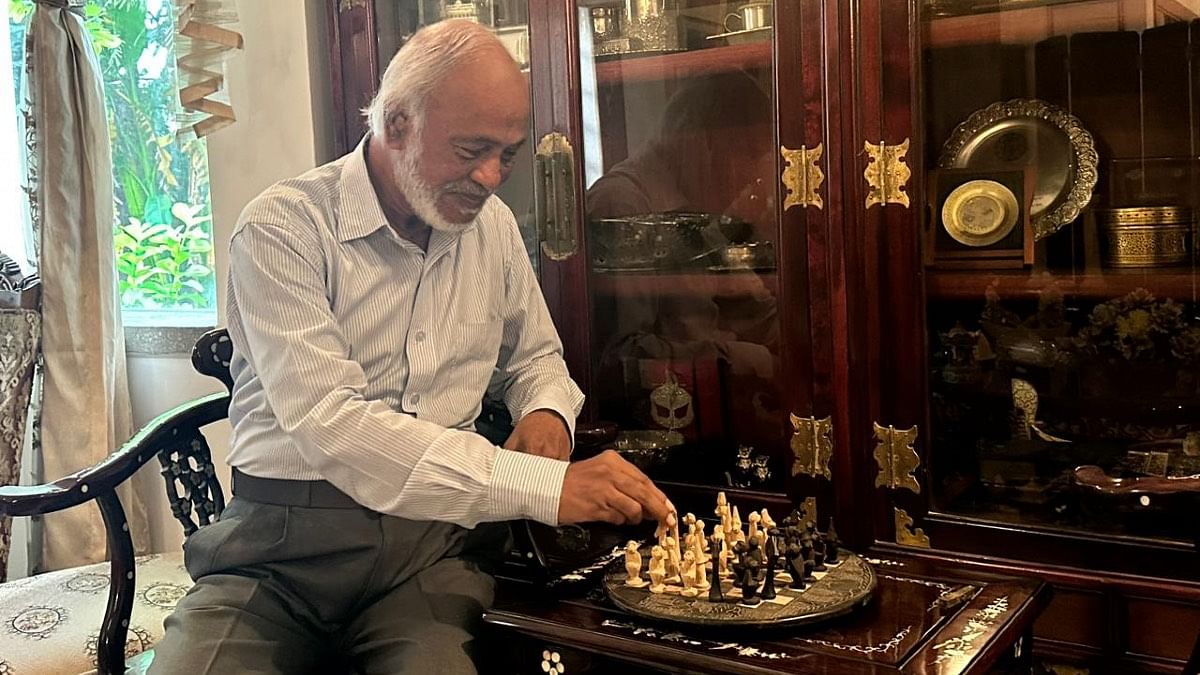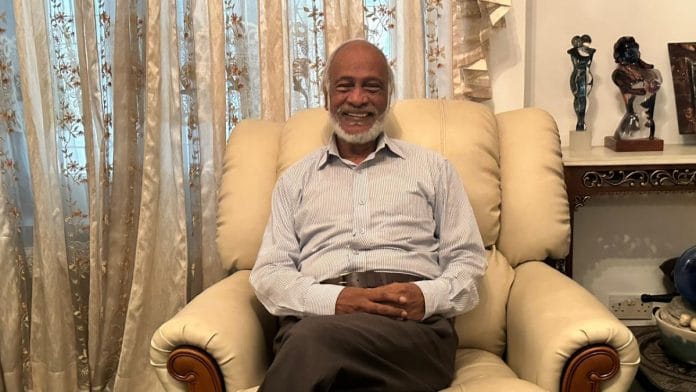Dhaka: As Bangladesh limps back to normalcy, focusing on reforms across institutions that had allegedly been corrupted and deeply politicised under the rule of Sheikh Hasina, top Bangladesh Nationalist Party leader and former cabinet minister Abdul Moyeen Khan has said that India is “lucky” to have been able to maintain its institutions for over 75 years.
Bangladesh is undergoing massive a political transformation after a weeks-long student movement led Hasina to resign in July, ending the Awami League’s rule after 15 years. An interim government, led by Nobel laureate Muhammad Yunus, now has the task of stabilising the country.
Speaking to ThePrint, Khan alleged, “Here in Bangladesh, the judiciary was captured by the executive.”
“Judges of the High Court did not write the judgments; the department of the minister of law did. They wrote the judgment and handed it over to the justices, just to announce it.”
“You are lucky in India,” he added. Khan said that, despite all criticism, India has been able to maintain its institutions since Independence. In contrast, he alleged, all institutions in Bangladesh—from the civil service and the police to the Constitution and the judiciary—had been captured by Hasina’s government.
“Look at the last general election in India. Your prime minister claimed that he would get more than 400 seats, but he ended up with less. This is proof that your process of democracy is working. This also proves that, in India, you have been able to maintain your institutions,” the BNP leader said.
Commenting on India-Bangladesh ties, Khan said the relationship had been affected because, instead of it being a friendship between the people, it became about ties between governments.
“The problem is if the friendship is government-to-government or party-to-party, what happens is that if the parties collapse, the friendship collapses; if the government collapses, then friendship collapses. And the example is right in front of us with India and Bangladesh,” he said.
“Hasina’s government collapsed, and the friendship between India and Bangladesh collapsed. This should be an eye opener to the policy planners, your South Block, and security strategists that they were blatantly wrong about Bangladesh,” he alleged.
He said that India had a big role to play in the 1971 Liberation War as it helped Bangladesh gain independence from Pakistan. Without its support, he said, Bangladesh may not have become an independent country within the short span of nine months.
However, he said, the people of Bangladesh had come to the realisation that the friendship India extended to them in 1971 has become a friendship “not between the people of Bangladesh and the people of India, but between two regimes. One in India and one in Bangladesh”.
The BNP leader claimed that Bangladeshis were not angry with Indians, but with the Hasina regime, which he accused of destroying democracy in the country.
“And when people realise that the government in India is still backing an autocrat who has done massive destruction in Bangladesh, they can’t believe how India can do this. Out of frustration, they have expressed their views against the Indian government, never against Indian people,” he said.
He said that it is sad that this friendship between people had been destroyed.“They have to seek friendship with the people, but not with the party or a government. India has to have a change of heart,” he said.
Also read: Who is Jashimuddin Rahmani, pro-al-Qaeda chief of Islamist outfit freed by interim Bangladesh govt
‘Opposition leaders killed, debt accumulated’
Discussing Hasina’s rule over the past 15 years and what led to her ouster, Khan said the problems in Bangladesh began when the country deviated from the path of democracy. In addition to unfair elections, he spoke about economic exploitation, physical torture and a total gag on dissent.
The goal of Hasina’s government was to stay in power and financially exploit Bangladesh, Khan alleged.
“People may think that everything occurred within a month or so, but the reality is different. For the past 15 years, the BNP and several other smaller opposition political parties continued to protest against the misdeeds of this government and the government responded by trying to shut down the lips of the Opposition, [obstruct] freedom of speech.”
“They obstructed the right of association of people, they obstructed any activity by the Opposition that the government considered a threat to them so that they may be removed from the government,” the BNP leader said.
Citing data, Khan said that Bangladesh’s external debt, which stood at $5 billion 15 years ago, was now $100 billion, “20 times what the Awami League government started with initially.”
He alleged that at least $100 billion had been illegally siphoned out of the country and put into reserves across several offshore banks by Awami League leaders. “It is unfortunate because that money belongs to the poor taxpayers of Bangladesh,” he said.
Khan said that while Hasina was preaching democracy, she was practising autocracy and behaving like a leader who was “worse than Hitler”.
“She had to go,” he said
“They [the Awami League] believed that they could continue to throttle the voices of the people of Bangladesh with the use of guns, but those guns eventually killed Hasina, the Awami League, and unfortunately, her father Mujib,” he said, metaphorically.
He alleged that if she had heeded the criticism of her government, her rule may not have ended this way.

A ‘mockery of elections’
Khan said that Hasina had made a “mockery of elections” with her past three poll victories.
“Now people can say this openly, although during the past 15 years in her regime, people were not even allowed to say that. If somebody said that the prime minister and the army were carrying out fictitious elections, they were put in jail, made to disappear,” he said.
This is the reason, Khan said, that the BNP did not take part in two of the elections (2014 and 2024). “If you take part in a rigged election, you legitimise a fake election. We did not want to become party to that,” the BNP leader said.
He added that besides being “self-destructive”, Hasina has destroyed the respect and stature enjoyed by her father, Sheikh Mujibur Rahman, as well.
Khan said that the protests only turned violent because of Hasina’s repressive measures.
“Bangladesh was born for one cause and that is democracy. When the people realised that there is no democracy in Bangladesh, they revolted peacefully. It was the government that used violent means, not the students,” he said.
“You can understand the frustration inside the mind of the people. The moment they got an opportunity for the outburst, it was like a flash flood,” he said.
‘Jamaat is not the force that India imagines it to be’
Speaking about the influence of Jamaat-e-Islami on the politics of Bangladesh, Khan said that Jamaat is not a strong political force and hardly commands 5 to 8 percent of the votes.
“I am perplexed by why politicians, policy planners, and security strategists in India don’t try to get to know the real scene on the ground in Bangladesh,” he said.
“Jamaat was never the force which India imagined it to be,” he said.
Adding that the BNP has no plans of coalition or collaboration with Jamaat because it has “seceded from Jamaat”, he said that whenever the Jamaat has been talked about lately, it has been the interim government or the army, not the BNP.
“It is the army chief who mentioned Jamaat in his speech; the BNP did not,” the leader said.
“To draw conclusions on the basis of certain notions and perception is not correct,’ he said.
He added that it was in fact the Awami League that first collaborated with Jamaat in 1996.
“In 1996, a person who is the head of the so-called peace committee which is founded by Pakistan was appointed minister by Hasina. The notional view you have from India is devoid of reality,’ he said.
“Yes, I do admit that, in 2001, the BNP went into an alliance with Jamaat, but that was an arithmetic alliance, not a conceptual alliance,” he added.
‘BNP does not believe in politics of vengeance’
Alleging that Hasina’s regime silenced the Opposition, Khan said that thousands of Opposition members had been abducted and there has been no trace of them till today.
“Around 10,000 political opponents have been killed on record by this government in the last 15 years.” he alleged. “1,00,000 fictitious cases have been instituted against the opposition party workers, there is not one single BNP political leader or worker who has not been accused in a fictitious case, and the total number of accused in these cases is half a million.”
“We know about autocratic countries around the world, we know about North Korea, but can you possibly show me a second example of a democratic country where you practice autocracy under the cover of democracy?” he asked
Talking about BNP, he said that the party does not “believe in a politics of retaliation or confrontation”.
“We do not also believe in politics of vengeance,” he said.
“We have been in government between 1979 and 1982, 1991 to 1996, and then, of course, 2001 to 2006. We do not believe in retribution or taking revenge, that kind of politics does not even arise for the BNP,” he added.
He said that if BNP comes to power in Bangladesh, he can “guarantee” that it will “never behave in the way the Awami League did”.
‘Attempts to destroy BNP backfired’
When asked about the BNP’s political ambitions going forward, Khan said that acting chairperson Tarique Rahman, the son of party president and former PM Khaleda Zia, was executing the party’s day-to-day work from the United Kingdom.
He said that, while Rahman does not plan on returning yet, if the people want to see him as the prime minister, they will make it happen.
“Hasina thought that if she can destroy Zia, she can destroy the BNP, but it backfired,” he said.
Khan said that on 5 August, Hasina fled, leaving behind her co-workers, just as Awami League leaders escaped when the Pakistan Army started firing on streets of Dhaka in 1971.
“When the Pakistani Army clamped down on innocent people of Bangladesh on the night of 25 March and started killing people indiscriminately on the streets of Dhaka, the Awami League did not show the courage to face it and fight,” he said.
“They escaped,” he added.
“They fled, just like Hasina did on 5 August. So many Awami League leaders have strong resentment against her as she did exactly what the Awami League did in 1971. This is vital as it exposes the character of a political party,” he said.
Khan said that the BNP’s founder, Ziaur Rahman, was the one who revolted against the Pakistani army.
“He grabbed the Pakistani transmitter and announced, ‘I do hereby declare independence of Bangladesh’.”
He added, “There are people who escape the enemy from the war and people who face them. If they’re not strong enough, they fight and die. The Awami League couldn’t do that. They escaped,” the top BNP leader said.
Interim govt’s key challenge: to bring back democracy
A challenge before the interim government, Khan said, is to effect a transformation from autocracy to democracy.
“The interim government should take it as a priority to make perhaps the essential steps which would allow them to carry a free and fair elections so that the people of Bangladesh can restore the democratic system,” he said.
He added that, in this tumultuous phase, the interim government should be very careful in deciding what its priorities are and not necessarily spreading itself thin trying to address every issue.
“I think that would be a blunder on their part, and then things will go out of hand,” the senior leader said.
(Edited by Sanya Mathur)






